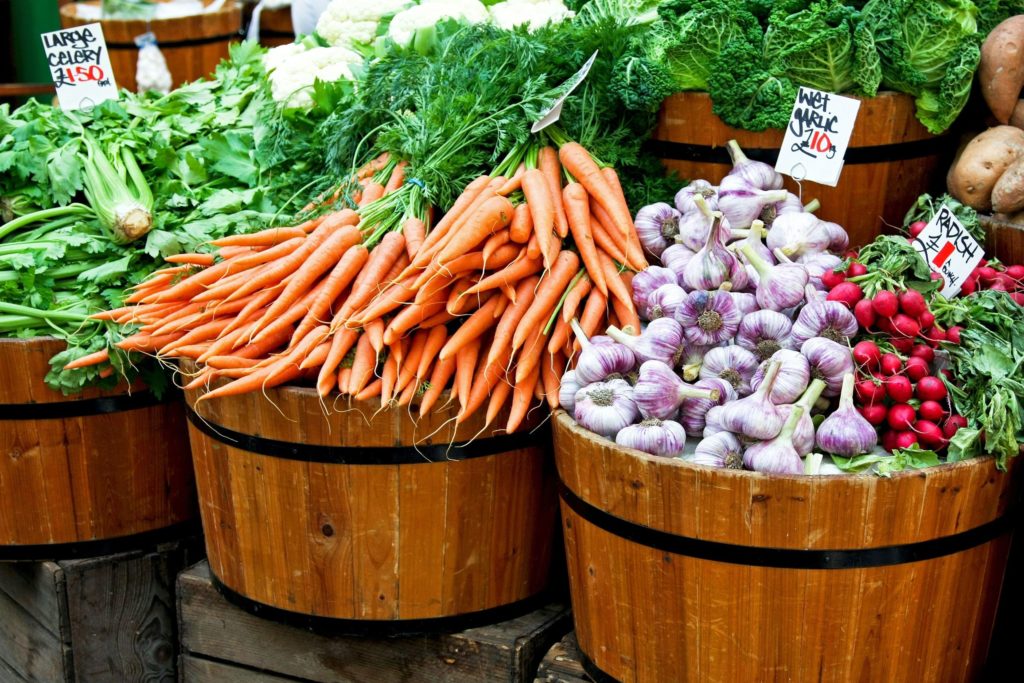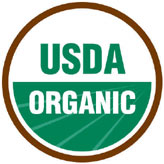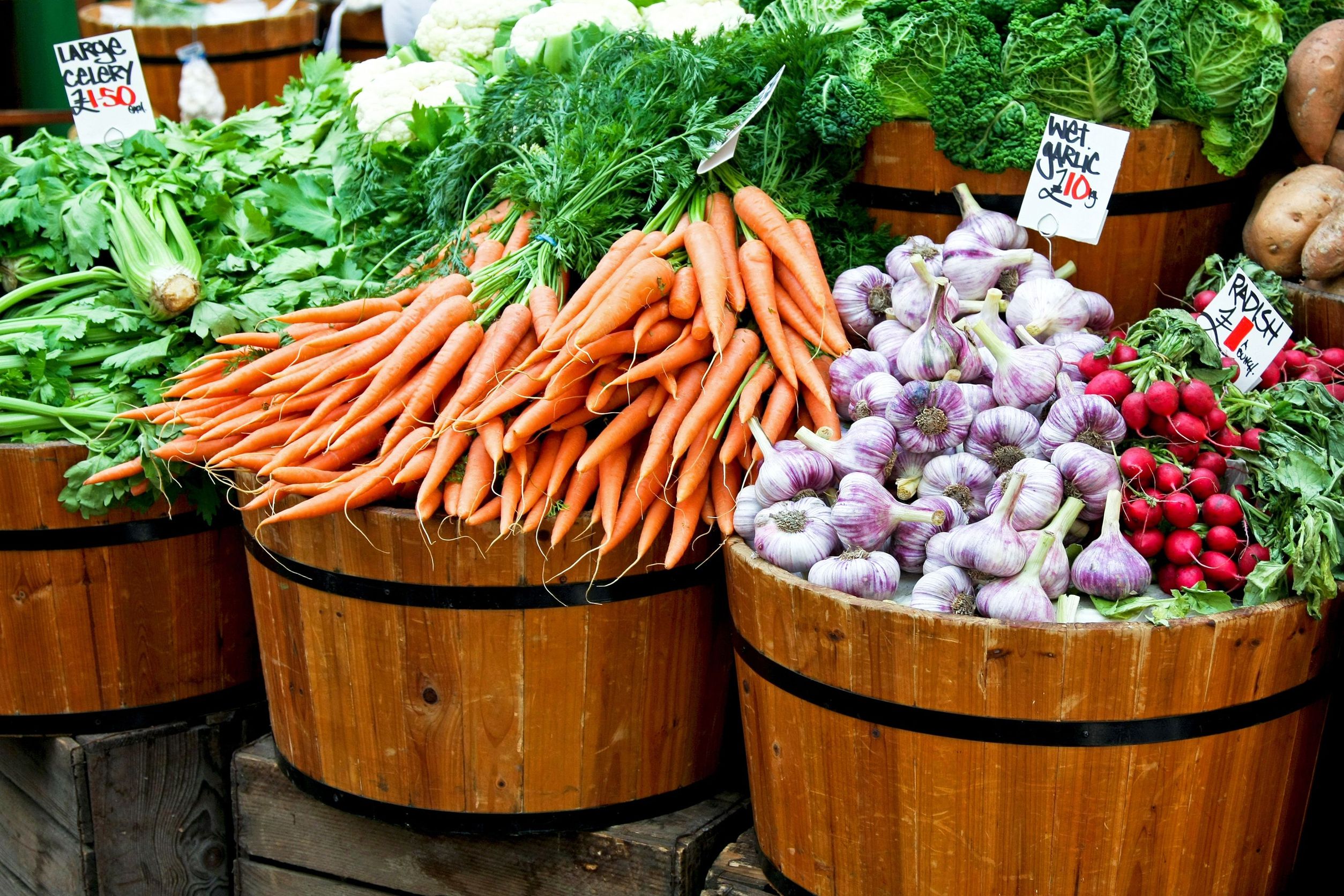
Regardless of the specific diet you follow, eating organic is a smart priority.
Nearly 75% of the 6,953 produce samples tested by the USDA (United States Department of Agriculture) in 2014 contained pesticide residues. And this is in the face of soaring consumer demand for food without synthetic chemicals. Unfortunately conventional fruit and vegetable industries seem to be ignoring this demand.
Organic food continues to become more available and can now be found in almost all markets and grocery stores. For many years, consumers had to travel to specialty stores and health food stores to find organic food. Then came Whole Foods, founded in 1978 and now with over 400 stores across the county, they literally led the nationwide movement to natural and organic eating.
Since 2013 other retailers have taken the lead in the organic movement. At the top of the pack….Costco! Followed by Wal-Mart and Kroger’s. Although Whole Foods is still very much in the business of organic food, it’s encouraging to see organics becoming more widely available.
Organic Labeling
How can you be sure something is truly organic? And actually what does organic even mean?
The term “organic” can be applied to plants, animal foods, fish, or seafood. Organic food is grown or produced without pesticides, fertilizers, genetic engineering, growth hormones, antibiotics, irradiation, or artificial ingredients.
There are several ways organic food is marketed.

Unless a food displays the USDA Organics label (or you have physically visited the farm and seen for yourself) you cannot be guaranteed that the food is indeed organic.
The following claims may be found on the packaging:
100% Organic: ALL ingredients are organic.
Organic: At least 95% of the ingredients are organic and warrants the USDA label.
Made with Organic Ingredients: At least 70% of the ingredients are organic.
Other Terms: Although these statements must be truthful, they do not imply that the food is organic.
- Natural
- Free-Range
- Hormone-Free
Why Eat Organic
Many studies over the past 20+ years have found that organic foods are healthier for both you and the environment.
Here are the Top 6 Reasons I believe you should be eating organic.
1. More Nutritious
A review of 41 studies published in The Journal of Alternative and Complimentary Medicine compared the nutritional value of conventional produces versus organically produced food. They found that the organic food on average had higher levels of iron, vitamin C, magnesium, and phosphorous.
Another review published in 2012 by researchers at Stanford concluded that there was little to no difference in the health benefits of organic versus conventional foods. Although the results of these two reviews are conflicting neither one takes into account, arguably the most important element of nutritional quality, phytochemical content.
Phytochemicals are plant chemicals that go beyond basic vitamins and minerals. Research continues to show how these nutrients are involved in keeping us healthy and keeping disease at bay. There are many factors that influence phytochemical content in a plant, several of which are directly influenced by farming practices.
Two of the most relevant include soil conditions and pest management. Healthy soil is essential in growing nutrient-dense foods. Organic farming practices take care to preserve healthy soil, which then allows the nutrients within the soil to be taken up by the growing plant, thus influencing the nutritional content of that plant. Industrial farming practices on the other hand continue to degrade and deplete our soil, leaving us with nutrient devoid soils.
Disease and pests are also important in the development of phytochemicals. When a plant has to defend itself against pathogens (as is the case with organic food) this increases its production of chemicals to help fight off the disease or pest, which in turn increases its level of beneficial phytochemicals.
2. Less Exposure to Chemicals
Eating organically grown food is the only way to avoid the cocktail of poisons currently in commercially grown foods. More than 600 active chemicals are registered for agricultural use in America, to the tune of billions of pounds annually. This translates to about 16 pounds of chemical pesticides each American is exposed to every year.
The National Academy of Sciences reports that 90% of the chemicals applied to foods have not been tested for long-term health effects before being deemed “safe.” Further, the FDA tests only 1% of foods for pesticide residue. The most dangerous and toxic pesticides require special testing methods, which are rarely if ever employed by the FDA.
Why take the chance? Organic farmers on the other hand manage pests by using insect traps, careful crop selection (disease-resistant varieties), predator insects, or beneficial microorganisms. Although unfortunately there’s no way to be 100% certain that pesticides haven’t drifted over from a neighboring commercial farm, you can be guaranteed that your exposure will be significantly less.
Even the above Stanford study that wasn’t able to conclude that the health benefits were any greater in organic foods, did find “significantly lower urinary pesticide levels among children consuming organic versus conventional diets”. When you consider how vulnerable our children are to the toxic effects of chemicals, this finding becomes incredibly important.
3. No Additives, Hormones, Antibiotics, or Other Drugs
Organic regulations ban or severely restrict the use of food additives, processing aids (substances used during processing, but not added directly to food) and fortifying agents commonly used in non-organic foods, including preservatives, artificial sweeteners, coloring and flavoring, and monosodium glutamate (MSG).
Conventional meat and dairy are at the highest risk for contamination by harmful substances (hormones, antibiotics, etc). It is estimated that more than 90% of the pesticides Americans are exposed to are found in the fat and tissue of meat and dairy foods.
4. No Genetic Modification
Genetically modified foods do not currently have to be labeled in America. Although this topic is still somewhat controversial I am concerned that exposure to GMOs is problematic to both our health and the environment. Because organically grown food cannot be genetically modified in any way, choosing organic is the only way to be sure that foods that have been genetically engineered stay out of your diet.
5. Environmentally Responsible
Aside from health reasons, there are also environmental benefits to choosing organic. Organic farming supports farming practices in harmony with nature. Preservation of soil and crop rotation keep farmland healthy, and chemical abstinence preserves the ecosystem protecting the soil and water from pollution. Wildlife, insects, frogs, birds, and soil organisms are able to play their roles in the tapestry of ecology, and we are able to play ours, without interference or compromise.
6. Preserves Agricultural Diversity
It is estimated that 75% of the genetic diversity of agricultural crops has been lost in the last century. Most conventional food is extremely hybridized to produce large, attractive specimens, rather than a variety of indigenous strains that are tolerant to regional conditions such as droughts and pests. Many organic farms grow an assorted range of food, taking natural elements and time-tested tradition into account. Diversity is critical to survival.
What About Cost
Unfortunately, it is a fact that organic food costs more. I dream of a day when this won’t be true but at the moment it is still the reality. And this is a real factor for many people who have to stretch their dollars as far as possible.
On a population scale however, buying organic is an investment in a cost-effective future. Every year, American tax dollars subsidize billions of dollars for a farm bill that heavily favors commercial agribusiness. This reveals a price tag that cannot be accurately measured but certainly includes other detrimental associated costs such as health problems, environmental damage, and the loss and extinction of wildlife and ecology.
Here are my suggestions if you currently can’t afford to buy 100% organic:
- First and foremost it is absolutely essential that you eat as many fruits and veggies as possible. So if organic isn’t in the equation, then buy conventional. In the end you will still get more benefit from eating the fruits and veggies then not.
- If you can afford to spend some money on organic then at least try to stick with the Dirty Dozen. This is a list published each year by the Environmental Working Group (EWG) that highlights the 12 fruits and vegetables that contain the most pesticide residue.
- For the produce that you aren’t able to buy organic, use a fruit/vegetable wash to help remove some of the pesticide residues along with bacteria and other pathogens. A simple homemade wash is as follows:
- Fill a large bowl with 4 parts plain water and 1 part plain white vinegar.
- Soak your fruit/veg in it for ~20 minutes.
- Rinse well with water.
- If possible, I would also suggest trying to buy your dairy and meats organic as the fat in those foods accumulate pesticides more than fruits and vegetables.
- Buy your produce in season as this helps to keep down the overall costs of your food. Berries sold in the heart of summer are much less expensive than berries sold in the middle of winter.
- Seek out local Farmers’ Markets, Community Supported Agriculture (CSA), or Farm Stands as they can often offer their goods at a lower cost by removing the middle man.
- Costco, Wal-Mart, and Trader Joe’s are also good grocery store options that can offer organic foods at a lower cost.
Take Home Message
Buying organically grown-food is a direct vote for your health, for the environment, and for a sustainable future for generations to come. If you can afford it, it is absolutely worth the added cost.
If however you are not currently in a position to buy 100% organic, don’t fret, use the tips above to be selective about where you spend your dollars and you can still get many of the benefits outlined above.
Here are some additional resources to help you find organic foods in your neck of the woods:
